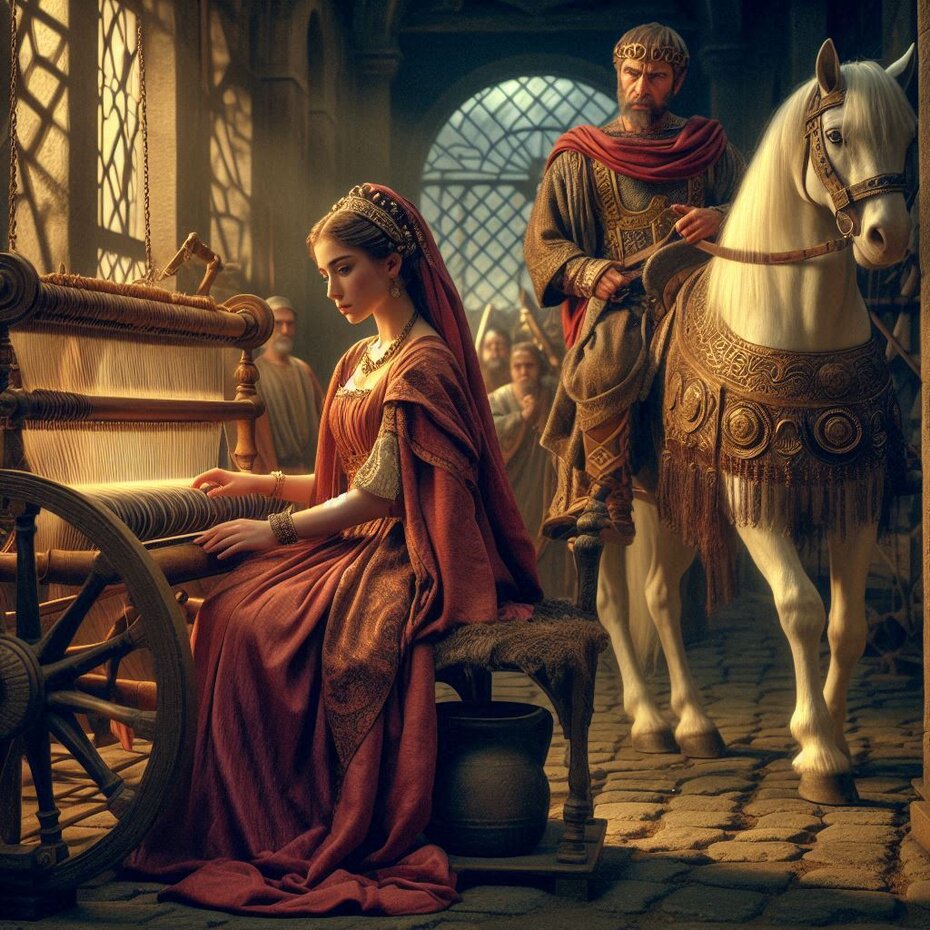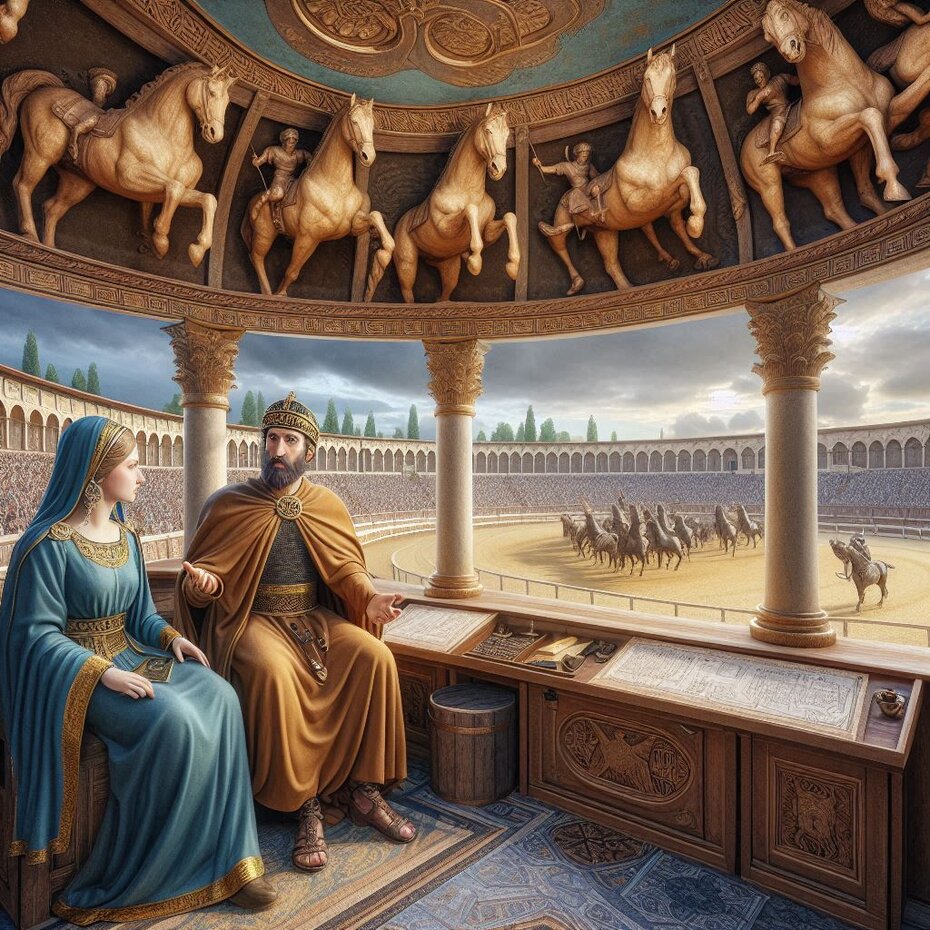The unbelievable life of Theodore of Byzantium (chapter 2)
This is the second chapter of the novel "The unbelievable life of Theodora of Byzantium". To read the first chapter, please click here.
After some time living a routine of deprivation and prayer in a small community lost in the middle of the desert, Teodora decided to return to the town where she had grown up. However, she was no longer the same woman, and now she could no longer provide sexual favors for her clients. She dreamed of leading a chaste life.
Antonina, her long-time friend and partner in the whorehouse, found her a job as a spinner in a weaving mill near the Hippodrome. Teodora now spent her days spinning on a spinning wheel, sitting right by the door to avoid boredom. From there she followed everything that went on around her and, as she was still a very beautiful woman, she attracted the attention of passers-by, including the most powerful. Theodora's clothes and demeanor had changed, but she still had the mind of a strategist...

The Hippodrome of Constantinople was one of the most important centers of entertainment and public life in the city, and could hold up to 60,000 spectators, as well as having a luxurious box with bronze horse statues on the ceiling for the emperors. Chariot races and fights were held on the central sand track. The competitors in the fights were supported by different political parties, and they often ended in slaughter. There were different factions competing for the prizes, but the main ones were the Green, supported by the merchants, and the Blue, by the aristocracy.

On days when there were fights, races or artistic performances, the street where Teodora worked would overflow with people on their way to the Hippodrome. It was on one of these days that she met Petrus Sabbatius. He was a short man, 39 years old, with a shapely torso, curly hair and a gray face due to his beard. Despite not being handsome, he had his charm, although much of this was due to his imperial guard uniform. But not even the gaudy outfit could disguise his most serious flaw: Petrus had a 'je ne sais quois' of roughness about him.
He was a simple man, the son of farmers, and would have led a humble existence in the countryside if he hadn't been adopted by his uncle Justin. After his adoption, his name was changed to Justinian and he received an exquisite education. Although he attended the court of Emperor Anastasius, he never fully integrated into the ruling elite of the empire, remaining faithful to his origins. Some jokingly called him “parvenu”, a derogatory term equivalent to today's “nouveau riche”.
The day they met for the first time, Justinian was unhappy with his own life. When he saw Teodora sitting outside the weaving store, illuminated by a single ray of sunlight that filtered through the awnings of the stores, he fell in love with her. It was as if his life began to make sense at that moment. Despite her modest clothes and modest status as a weaver, she carried herself proudly. She, who had already faced crazed bears and violent men, was afraid of nothing else. And that was clear in her eyes. Theodora had all the self-confidence and dignity that Justinian lacked.
Justinian soon decided to marry Theodora, even though her past could become a problem for his military career and public life. Despite his good intentions, nothing could be done, as there were two serious obstacles to the marriage: there was a law that forbade government officials from marrying artists, and Euphemia, a religious woman of a prudish and tedious character who was married to his uncle Justin, was firmly opposed to this relationship.
However, things were arranged over time. Soon after his uncle Justin ascended the throne, the laws preventing Justinian from marrying were changed. Five years later, his aunt Euphemia died of natural causes, so the last barriers to marriage were removed, as his uncle was very fond of Theodora. The lovers were finally able to make their relationship official!
Emperor Justin himself was from as simple a background as his nephew. However, he had been lucky to join Emperor Anastasius' military guard during the invasion of the Huns and had a brilliant military career. His devotion to the imperial family was rewarded when he was chosen by the military guard and the troops to succeed Anastasius when he died without leaving any heirs.
Justin's power and the exemplary dedication to work of Justinian led to a meteoric career during the nine years his uncle ruled the empire. From being a member of the imperial guard, he went on to become Master of the Soldiers and of the Cavalry and Infantry Units, to Consul, Patrician, Most Noble and finally Caesar, without ever having taken part in any military campaign. He became the natural candidate to succeed Justin, and was elected the new emperor on Easter Day 527 AD, at the age of 45.
Perhaps because he considered himself undeserving of the position he held, Justinian worked hard and tirelessly, going virtually without sleep for long periods. He had a reputation for being a leader who was extremely committed to his duties, involving himself personally in various aspects of the administration.
Soon Theodora also proved to be a skillful ruler. Strong in character and full of her own ideas, she fought for the recognition of women's rights. A series of new laws were created to protect women and give them equal rights with men in various legal matters. Prostitution was banned and brothels were closed down, with former prostitutes sent to institutions specially created to protect them. She also instituted the death penalty for rape and forbade the murder of women guilty of adultery. In addition, the abandonment of unwanted children was prohibited.
However, just five years after they became emperors, there was widespread dissatisfaction with the excessive taxes being levied on the people to finance the construction of the Basilica of St. Sophia. In addition, the excessive violence of members of the Green and Blue factions during the fights in the Hippodrome of Constantinople had culminated in those who had committed the murders during the fights being sentenced to death. Although the people had asked the Emperor for clemency, he refused, causing the factions to become enraged. As a result, the situation degenerate .
It was then that Theodora addressed the Emperor and his troops saying, “As for me, I prefer the old admonition: purple is a beautiful shroud. If the Emperor wishes to save himself by fleeing, it will be easy. We have plenty of gold; the sea is at hand; the ships are ready. But let those who have already sat on the throne beware of surviving the loss of it! For I, for my part, believe that it will not be appropriate for me to flee. If I must die, let it be as empress.”
Theodora's speech reversed the situation, convincing Justinian to send his troops to contain the rioters, resulting in the murder of 30,000 spectators and the partial destruction of Constantinople. This event became known as the Nika Revolt.
After the revolt was brought under control, Justinian and Theodora led the reconstruction of Constantinople, which became the most splendid city in the world for centuries, boasting a profusion of aqueducts, bridges and churches. Theodora's role as corregent was never challenged due to her libertine past, in fact everyone bowed to her as if she were a goddess. This, in fact, was the behavior demanded by the couple of emperors: everyone had to prostrate themselves in front of her.
Theodora died of breast cancer at the age of 48, after being in power for a quarter of a century. It is said that her husband wept copiously during the funeral. He still held power for another seventeen years, being succeeded on his death by his nephew Justin II. However, the Byzantine Empire was to face serious problems, such as invasions and economic difficulties, which resulted in the end of its glorious period.
Translation to english was done with the free version of DeepL
Voltar
